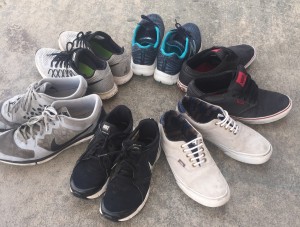What’s up in the world?
April 1, 2016
What’s up peeps? The weekend of Good Friday, Passover, Easter and Resurrection has “passed-over,” so it’s time to catch up on what’s been going on in the world.
Lahore Suicide Attack (March 27)
Easter wasn’t the day of peace most hoped for with a Taliban suicide bombing on Sunday evening, targeting Christians in Lahore, Pakistan. The attack killed at least 70, leaving 340 wounded in the busy city’s park.
The responsible militant group, Jamaat-ul-Ahrar, has been at the center of several major attacks and is a faction of the Pakistani Taliban. The group split off in 2014, claiming peace with the Islamic State, but soon reaffirmed relations with the Taliban.
The Sunday attack mainly killed women and children who were outside enjoying the Easter-day weather. Unfortunately, attacks are quite common in the violence-ridden Pakistan region.
Islamist militant aggression in the region has been on the rise ever since the U.S. retaliated after the 9/11 bombing. The two opposing forces have been at each other’s throats, but this most recent Taliban attack resulted in a not-so-”hoppy” Easter.
Georgia’s “Religious Liberty” Bill (March 28)
This peachy state has been making not-so-sweet national and global headlines lately with the proposal of its “Religious Liberty” bill. This House-bill, which was first proposed on March 16, passed through the both of Georgia Republican-majority chambers and only needed the approval of Gov. Nathan Deal.
If passed, the bill would allow businesses and religious leaders to refuse services or marriage ceremonies if these dealings would directly conflict with their religious beliefs. On Monday, Deal announced his plans to veto the bill.
Georgia faced extreme opposition in HB 757’s passage. As a major business hub, the state could have taken a hard hit with the bill’s passage. Georgia is a home to several corporations and industries such as Coca-Cola, Apple, Intel and Salesforce, who all object to the discriminatory qualities of the religious bill.
While Deal is a fond supporter of protecting First Amendment rights to practice religion, he also keeps a keen eye on businesses and the overall welfare of the state. Losing business from these economic titans could plunge Georgia into financial darkness.
Because Disney, Marvel and Time Warner are a part of the mix of companies who were alarmed by the bill’s passage, and since the movie industry accounts for about 30 percent of Georgia’s business revenue, Deal chose to not run the risk of killing the Georgian economy and promptly vetoed the bill’s passage.
Obama vs. Opioid (March 29)
On Tuesday, Obama proposed a plan to fight the increasing opioid addiction during his speech at the National Rx Drug Abuse and Heroin Summit in Atlanta. Obama ranks this issue at the top of his agenda among terroristic threats, natural disaster response and economic strength.
Overdose on opioids, addictive pain medication including codeine, morphine and legal narcotics, is a leading cause of unnatural death in the U.S., supposedly surpassing death rates due to traffic accidents.
Obama seeks congressional support to fund a program worth $1.1 billion to provide treatment to opioid abusers. Resources to fund opioid addiction programs were already worked into the national budget. However, new bipartisan legislation could greatly expand the money allocated to help combat the soaring opioid-related death rate.
San Bernardino Shooter’s iPhone Unlocked (March 30)
An apple a day may keep the doctor away, but one thing is apparent: Apple’s dismay cannot keep the FBI away. Following the December mass-shooting in San Bernardino, CA that took 14 lives, the FBI relentlessly sought Apple’s aid to unlock gunman Syed Rizwan Farook’s iPhone. Apple, however, refused to comply, fearing that doing so could later compromise the privacy of its millions of iPhone users and consumers.
Despite the setback, the FBI surged forward in its investigation and announced on Wednesday that it was able to unlock the iPhone. Law enforcement has yet to disclose what its alternative method to cracking into the phone was, leaving lots of questions unanswered concerning the security and privacy of law-abiding citizens.
Apple itself is unsure of the FBI’s technique used to retrieve Farook’s data but would like to know in order to refine its products’ security systems. This discord between national security and personal privacy could potentially end with legal standoff between the government and this multi-billion dollar company.
US vs. Nuclear North Korea (March 31)
President Barack Obama met with allies South Korea and Japan on Thursday to discuss the growing threat of North Korean nuclear buildup. The three United Nations members hope to gain international support against the North Koreans to denuclearize the whole peninsula. If the country refuses to abide to these requests, South Korea foresees additional sanctions and further isolation in the North’s future.
The 2016 Nuclear Security Summit made plans to combat the smuggling of nuclear materials by enforcing high-crime penalties. North Korea recently tested nuclear weapons and a rocket, intensifying concerns about the country’s intentions with its new stockpile of nukes.
The North Korean government is also launching new propaganda campaigns against South Korea and the U.S., threatening to show off its newfound power by attacking these two nations.
Obama saw this summit as his final opportunity to call attention to the severity of this threat on national and international security before his term comes to a close. His next step is to meet with French President Francois Hollande concerning the Paris and Brussels attacks as the two-day summit draws to a close today.








